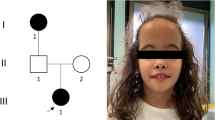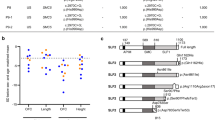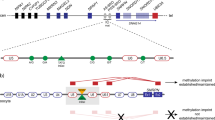Abstract
Prader-Willi syndrome (PWS) is caused by deficiency for one or more paternally expressed imprinted transcripts within chromosome 15q11-q13, including SNURF-SNRPN and multiple small nucleolar RNAs (snoRNAs). Balanced chromosomal translocations that preserve expression of SNURF-SNRPN and centromeric genes but separate the snoRNA HBII-85 cluster from its promoter cause PWS. A microdeletion of the HBII-85 snoRNAs in a child with PWS provides, in combination with previous data, effectively conclusive evidence that deficiency of HBII-85 snoRNAs causes the key characteristics of the PWS phenotype, although some atypical features suggest that other genes in the region may make more subtle phenotypic contributions.
This is a preview of subscription content, access via your institution
Access options
Subscribe to this journal
Receive 12 print issues and online access
$209.00 per year
only $17.42 per issue
Buy this article
- Purchase on Springer Link
- Instant access to full article PDF
Prices may be subject to local taxes which are calculated during checkout


Similar content being viewed by others
References
Schulze, A. et al. Nat. Genet. 12, 452–454 (1996).
Wirth, J. et al. Hum. Mol. Genet. 10, 201–210 (2001).
Schüle, B. et al. BMC Med. Genet. 6, 18 (2005).
Gallagher, R.C. et al. Am. J. Hum. Genet. 71, 669–678 (2002).
Runte, M. et al. Hum. Mol. Genet. 10, 2687–2700 (2001).
de los Santos, T. et al. Am. J. Hum. Genet. 67, 1067–1082 (2000).
Gunay-Aygun, M. et al. Pediatrics 108, e92 (2001).
Runte, M. et al. Hum. Genet. 116, 228–230 (2005).
Sun, Y. et al. Hum. Mol. Genet. 5, 517–524 (1996).
Kuslich, C.D. et al. Am. J. Hum. Genet. 64, 70–76 (1999).
Conroy, J.M. et al. Am. J. Hum. Genet. 61, 388–394 (1997).
Burger, J. et al. Am. J. Med. Genet. 111, 233–237 (2002).
Kishore, S. et al. Science 311, 230–232 (2006).
Ding, F. et al. PLoS ONE 3, e1709 (2008).
Skryabin, B.V. et al. PLoS Genet. 3, e235 (2007).
Acknowledgements
This work was supported by US National Institutes of Health grants HD-037283 and M01-RR00188 (General Clinical Research Center), HD-024064 (Mental Retardation and Developmental Disabilities Research Center) and RR-019478 (Rare Disease Clinical Research Consortia). We thank J. Bressler for critical reading of the manuscript.
Author information
Authors and Affiliations
Corresponding author
Supplementary information
Supplementary Text and Figures
Supplementary Note, Supplementary Methods, Supplementary Tables 1 and 2 and Supplementary Figures 1 and 2 (PDF 343 kb)
Rights and permissions
About this article
Cite this article
Sahoo, T., del Gaudio, D., German, J. et al. Prader-Willi phenotype caused by paternal deficiency for the HBII-85 C/D box small nucleolar RNA cluster. Nat Genet 40, 719–721 (2008). https://doi.org/10.1038/ng.158
Received:
Accepted:
Published:
Issue Date:
DOI: https://doi.org/10.1038/ng.158
This article is cited by
-
Small nucleolar RNA Snora73 promotes psoriasis progression by sponging miR-3074-5p and regulating PBX1 expression
Functional & Integrative Genomics (2024)
-
FUS regulates a subset of snoRNA expression and modulates the level of rRNA modifications
Scientific Reports (2023)
-
Novel epigenetic molecular therapies for imprinting disorders
Molecular Psychiatry (2023)
-
The contribution of imprinted genes to neurodevelopmental and neuropsychiatric disorders
Translational Psychiatry (2022)
-
Gastric aspiration in sudden unexpected infant death of Prader–Willi syndrome: immunohistochemical detection of feeding components
International Journal of Legal Medicine (2022)



